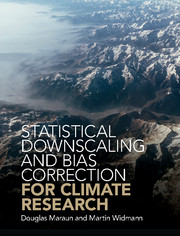Book contents
- Frontmatter
- Dedication
- Contents
- Preface
- Acknowledgements
- 1 Introduction
- Part I Background and Fundamentals
- Part II Statistical Downscaling Concepts and Methods
- 10 Structure of Statistical Downscaling Methods
- 11 Perfect Prognosis
- 12 Model Output Statistics
- 13 Weather Generators
- 14 Other Approaches
- Part III Downscaling in Practice and Outlook
- Appendix A Methods Used in This Book
- Appendix B Useful Resources
- References
- Index
13 - Weather Generators
from Part II - Statistical Downscaling Concepts and Methods
Published online by Cambridge University Press: 27 December 2017
- Frontmatter
- Dedication
- Contents
- Preface
- Acknowledgements
- 1 Introduction
- Part I Background and Fundamentals
- Part II Statistical Downscaling Concepts and Methods
- 10 Structure of Statistical Downscaling Methods
- 11 Perfect Prognosis
- 12 Model Output Statistics
- 13 Weather Generators
- 14 Other Approaches
- Part III Downscaling in Practice and Outlook
- Appendix A Methods Used in This Book
- Appendix B Useful Resources
- References
- Index
Summary
For many applications long weather time series are required (Richardson and Wright 1984): for instance, to drive impact models for deriving design values of hydraulic structures or to assess meteorological impacts on hydrology or agriculture. In practice, however, observational records are often short, suffer from gaps and inhomogeneities or are simply missing for some meteorological variables. Weather generators have been developed to synthetically generate weather time series of, at least in theory, infinite length.
DEFINITION 13.1 As weather generators we define stochastic models of meteorological variables that explicitly model their marginal distribution and temporal dependence.
Since the development of the first precipitation (Buishand 1977, Katz 1977) and weather generators (Richardson 1981), these models have become widely used to produce long surrogate time series, to impute missing data (e.g. Yang et al. 2005) and increasingly to downscale climate projections for impact assessment (e.g. Hulme et al. 2002).
In the following, we will first introduce the assumptions underlying the use of weather generators in climate change studies (Section 13.1), followed by an overview of the most widely used weather generator approaches (Section 13.2). Structural skill of weather generators will be discussed in Section 13.3. Finally, we will present approaches to incorporate climate change in weather generators in Section 13.4. The development of weather generators is – depending on how they incorporate climate change – similar to the PP and MOS approaches. For conditional weather generators, refer to the PP cookbook in Section 11.7; for change-factor weather generators, refer to the MOS cookbook in Section 12.10.
Assumptions
As will be discussed in detail in Section 13.4, weather generators can be used in two different settings to downscale climate projections: with so-called change factors – climate model–simulated changes in long-term climate statistics, which are used to modify the parameters of the weather generator – and with time series of meteorological predictors, taken from climate model simulations, that condition the weather generator parameters on a day-by-day basis and impose long-term changes.
- Type
- Chapter
- Information
- Statistical Downscaling and Bias Correction for Climate Research , pp. 201 - 219Publisher: Cambridge University PressPrint publication year: 2018

